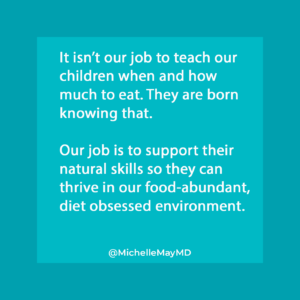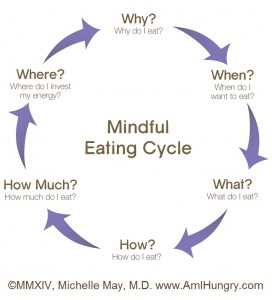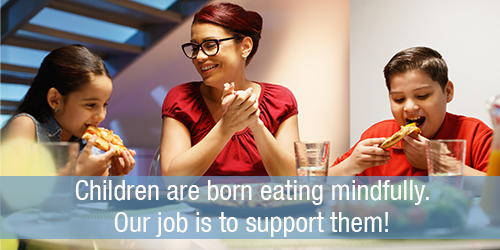When I’m working with my coaching clients who have children or grandchildren, they sometimes wonder how to share what they’re learning with their families. They’re particularly curious about mindful eating for children, since kids naturally exhibit many of the skills they are learning.
Mindful eating and children
As parents, we’re supposed to teach our children healthy habits. As a doctor, I was supposed to model healthy habits for my patients too.
The truth is, my habits weren’t particularly healthy back then.
By the time my children could both walk and talk, I had been yo-yo dieting for nearly 25 years. It may not have been obvious on the outside, but my head was filled with food rules acquired from years of intermittent restriction to make up for years of mindless and emotional eating.
I could estimate the calories and points of just about any food. I knew how long I had to spend on the treadmill for eating a “bad” food. I had worn out the pages of my Weight Watchers Cookbook. I regularly experienced the elation, deprivation, and guilt of my perpetual eat-repent-repeat cycle.
 I admired my husband’s ability to eat whatever he wanted. He certainly didn’t seem to have extraordinary willpower and he ate whatever he wanted. I just assumed he was just lucky to have a great metabolism. That was a trait I hoped my children would inherit from him.
I admired my husband’s ability to eat whatever he wanted. He certainly didn’t seem to have extraordinary willpower and he ate whatever he wanted. I just assumed he was just lucky to have a great metabolism. That was a trait I hoped my children would inherit from him.
Fortunately, our children also seemed to effortlessly eat what they liked (within the reasonable, not rigid, parameters we set). I was careful not to impose my diet-thinking on them because deep down, I knew it wasn’t working for me and it wouldn’t work for them either.
As I marveled at their instinctive ability to regulate their fuel intake according to their needs, I realized that they hadn’t inherited it from my husband.
We are all born with the instinctive ability to manage our eating naturally!
Children are born eating mindfully!
From the moment they’re born, children are instinctively in tune with their body’s hunger and fullness signals. It may take caregivers a while to interpret their child’s signals, but soon, they usually get in sync.
 Children are also naturally curious, a key to mindfulness. They love to examine, touch, smell, and play with their food. They will taste it, maybe cautiously at first, then decide whether they like it. They learn easily at this stage so exposing them repeatedly to certain foods allows them to adapt.
Children are also naturally curious, a key to mindfulness. They love to examine, touch, smell, and play with their food. They will taste it, maybe cautiously at first, then decide whether they like it. They learn easily at this stage so exposing them repeatedly to certain foods allows them to adapt.
Of course, they aren’t born knowing anything about nutrition; that’s our job. But they don’t know anything about society’s definitions of good or bad foods either! As a result, they learn to eat what their family eats.
As children grow, some unlearn these skills. They learn to eat for reasons other than hunger—mealtimes, tempting food, stress, boredom, anger, deprivation, guilt, and countless other triggers—and often choose foods based on those triggers.
I realized my job wasn’t to teach my kids when and how much to eat; they already knew that. My job was to provide them with a variety and a balance of delicious, nutritious foods and support their natural skills, so they could thrive within the current food-abundant environment.
In other words, maintain the natural mindful eating skills children already have!
Your instinctive mindful eating skills
 I stopped dieting and eventually re-learned to eat according to my body’s signals.
I stopped dieting and eventually re-learned to eat according to my body’s signals.
I developed the Mindful Eating Cycle to help others learn how to too. (From Eat What You Love, Love What You Eat: A Mindful Eating Program to Break Your Eat-Repent-Repeat Cycle.)
So what are the instinctive skills we’re born with to manage our eating?
Let’s briefly explore each of the six decision-making skills in the Mindful Eating Cycle and talk about what parents can do to support mindful eating for children, and if necessary, relearn it for ourselves.
(To find out if you’ve forgotten these skills, take this quiz.)
Supporting their Instinctive Eating Cycle
Why? Why do I eat?
When you eat instinctively, your need for fuel is the main driver for eating. (Though it’s normal to also eat for pleasure, comfort, or convenience.)
What parents can do:
- You are responsible for making sure your children’s fuel needs are met consistently.
- Provide snacks and meals on a regular basis, but don’t interfere with your child’s ability to know whether they need food at a particular time.
When? When do I eat?
When your body needs fuel, it triggers the physical sensations that tell you you’re hungry.
What parents can do:
- Recognize and respond to your baby’s or child’s signals of physical hunger.
- Learn to tell when they are fussing or crying due to other needs, such as being wet, cold, bored, overstimulated, gassy, and so forth.
- Scarcity and excessive hunger are powerful triggers for a fearful attachment to food and overeating when food is available.
- As they grow, provide balanced, enjoyable meals at reliable intervals and offer appropriate snacks for hunger that occurs between meals.
- For older children, give them increasing responsibility for meeting their fuel needs.
What? What do I eat?
Our food choices are affected by availability, preferences, social and emotional influences, awareness of nutrition information, and many other factors. When given positive exposure to a variety of foods in a supportive, non-coercive manner, children naturally seek balance and moderation in their eating.
What parents can do:
 Use the simple “all foods fit” approach to nutrition.
Use the simple “all foods fit” approach to nutrition.- Avoid labeling foods as “good” or “bad.”
- Provide a consistent supply of interesting, healthful foods, and model enjoyment when eating these foods.
- Don’t use bribes, threats, or guilt to control eating or behavior.
- Don’t become a “short-order cook.”
How? How do I eat?
When you’re eating to satisfy hunger and nourish your body, you eat mindfully, paying attention to the food and your body’s signals.
What parents can do:
- Allow babies and young children to “play with their food.” They learn experientially and positively using all their senses. (Sometimes, a child who loses interest in eating and begins playing with their food is no longer hungry.)
- Involve children in selecting and preparing food.
- Eat together as a family as often as possible. (Pizza or a meal at a fast food restaurant counts!)
- Make the family table a pleasant, relaxed time for nourishment and connection.
How Much? How much do I eat?
You typically decide how much food to eat by how hungry you are. When your hunger is satisfied, you usually stop eating, even if there’s food left. You recognize that being too full is uncomfortable and unnecessary since you’ll eat again when you feel hungry again.
What parents can do:
 Observe for signals your child is satisfied. Babies will slow down, pull away, start looking around, or fall asleep. Toddlers will refuse food, spit it out, play with it, throw it on the floor, and/or become easily distracted. Older children will verbalize that they are full and exhibit other disinterested behaviors.
Observe for signals your child is satisfied. Babies will slow down, pull away, start looking around, or fall asleep. Toddlers will refuse food, spit it out, play with it, throw it on the floor, and/or become easily distracted. Older children will verbalize that they are full and exhibit other disinterested behaviors.- Offer serving sizes that are appropriate for the child’s age and development.
- Don’t bribe or threaten children to continue eating beyond these natural boundaries or they’ll learn to override their body’s signals, leading to overeating when portion sizes are larger than they need.
Where? Where do I invest my energy?
Your fuel is used to live your life. For children that includes growing, exploring, playing, and learning. Any leftover fuel is stored until it’s needed.
What parents can do:
- Play together as a family. Encourage fun activities.
- Limit sedentary activities and screen time.
- Don’t focus on physical appearance – your child’s, yours, or other people.
- Model appreciation for the body’s capacity to become more energetic, stronger, and flexible.
Our children don’t need us to teach them when and how much to eat! But they need us to model a healthy, balanced approach to food and provide enjoyable meals and physical activity as a family.
This article has been updated from a previously published version.
Enjoyed this article? Here are three more to help you:
You’re not the boss of my body! How to support healthy habits in children
A Compassionate Response to Emotional Eating
Do fear and threats lead to behavior change?



8 thoughts on “Mindful Eating for Children: What my kids taught me about eating mindfully”
Michelle — you hit the nail on the head with this post! I’m always telling parents that they can learn so much from their kids. Yound children are clean slates with food and eating– and we can either nuture their natural ability to regular food or teach them the controlled way of eating that doesn’t work. This lesson can heal so many parents who are also struggling. Thanks for summarizing it up so nicely!
So much to learn from this post! Thanks for taking the time to write it; I will be sharing and referring to it often.
Hi Michelle:
What a wonderful post! I completely agree with the basic idea that we all have an instinctive ability to regulate our food intake. The best way for me is to not miss breakfast, then eat a small midmorning snack so I don’t end up eating too much at lunch. Same goes for a mid to late afternoon snack. I have to plan well if I go for a workout (which I usually do before lunch or late evening before dinner). Always take a snack 1/2 to 1 h before the workout.
Really appreciate your thoughtful writing with practical tips!
Thank you Naveen. Awareness of what works best for us shifts our perspective from what “should” I do, to what will I do to feel my best?
Comments are closed.